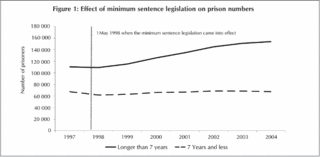Life terms and mandatory sentencing
Call me philosophical, but I've always thought that the rape of children is equitable to a murder of their souls, such is the psychological damage done to the child, inferring an inherent difficulty in continuing to live out the rest of their lives. The government recently extended the minimum life sentence for the rape of a person under sixteen, and it is with great pleasure that I read that a judge yesterday handed down three life sentences to a father who was repeatedly raping his three daughters.
Child rape is a despicable scourge in South Africa, and although my words can do nothing to dent the prevalence of it in our society, one hopes that more publicity surrounding these life sentences may go some way to dissuading those perpetrators from action, and persuading them to find psychological assistance.
My emphasis here on child rape is not by way of ignoring the rape of those above the age of sixteen, which is an almost hourly occurrence in South Africa as well. The difficulties are often in proving rape over consent in these cases, but I strongly support the harsher minimum sentencing for rape cases in these instances as well. As it stands, the minimum sentencing laws are:
A life sentence is mandatory three cases of rape. The first is when it is committed
1. in circumstances where the victim was raped more than once, whether by the accused or by any co-perpetrator or accomplice;
2. by more than one person, where such person acted in the execution of [or?] furtherance of a common purpose or conspiracy;
3. by a person who has been convicted of two more offences of rape, but has not yet been sentenced in respect of such convictions; or
4. by a person, knowing that he has acquired immune deficiency syndrome or the human immunodeficiency virus.
The second instance (really three instances, grouped together) where a life sentence is mandatory for rape is where the victim is a girl under the age of 16 years; is a physically disabled woman who, due to her physical disability, is rendered particularly vulnerable; or is a mentally ill woman as contemplated in specified legislation relating to mental health.
Thirdly, a person convicted of rape must be sentenced to life imprisonment where the rape involved the infliction of grievous bodily harm.
Minimum sentencing has it's critics, mostly over issues of overcrowding. This graphic (click to enlarge), taken from a 2005 ISS paper (available here) shows the impact of minimum sentencing since inception in 1998:

We still hear of judges giving substantially reduced sentences in cases of rape, under the provision in the mandatory sentencing act which states that if a court "is satisfied that substantial and compelling circumstances exist which justify the imposition of a lesser sentence than the sentence prescribed in those subsections, it shall enter those circumstances on the record of the proceedings and may thereupon impose such lesser sentence."
Taken in totality, mandatory sentencing has increased prison populations, but I strongly feel that they are a step forward in our country's fight against crime, and a form of insurance against corruption in the judiciary. There is current debate about their efficacy, with a view to dropping the legislation. I sincerely hope this does not occur.






<< Home